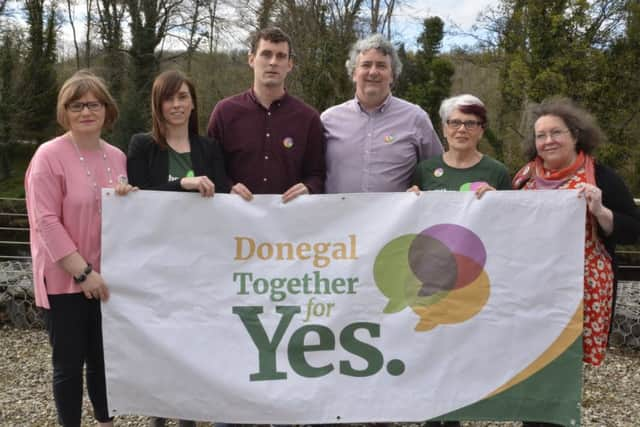THE EIGHTH AMENDMENT: '˜I have to campaign for change to this outdated and dangerous law'


As my children have grown up and become adults themselves, my understanding that the world is not black and white has grown. It’s my maternal instinct which is driving me, much more than any other reason, to campaign for a Yes vote to remove the Eighth Amendment from our constitution.
My thoughts have evolved with the gradual realisation that the Eighth Amendment has the potential to place my daughter at serious risk of ill health or even death in the worst case scenario. My love for my daughter has me wanting to do everything in my power to protect and support her. My love for my son makes me want to make sure he never has to go through the heartbreak of having to travel with his partner to access medical care in a foreign country should they receive a devastating diagnosis of a fatal foetal anomaly.
Advertisement
Hide AdAdvertisement
Hide AdThe Eighth Amendment does not stop Irish women accessing abortions. It has never stopped Irish women having abortions and it will never stop Irish women having abortions.


Since 1983, 170,000 women, enough to fill Croke Park twice, most of whom were already mothers, have travelled to England to access safe medical care they should have been able to get in Ireland. More still order abortion pills on the internet which they take at home, unsupervised by medical professionals. We know that 63 women in 2016 travelled from Donegal addresses to England. A quick calculation tells us that since 1983 that’s almost 2,000 Donegal women who have travelled from Donegal to England and Wales to access an abortion and that doesn’t take into account the women ordering pills online. In all likelihood you know someone who’s had an abortion, even if you don’t know they’ve had one.
If the aim of the Eighth Amendment was to prevent Irish women accessing abortions, it’s safe to say that it has failed spectacularly.
What the Eighth Amendment does do very effectively, and I do accept that this was not the intention of the people who voted it in 1983, is harm women. The Eighth Amendment ties doctors hands and prevents them from delivering the very best, evidence-based care to women and girls. Dr Peter Boylan, Chairman of the Institute of Gynaecologists and Obstetricians in Ireland and former Master of The National Maternity Hospital and Dr Rhona Mahoney, current Master of The National Maternity Hospital, just two of the foremost experts in obstetrics and maternal care in the country have testified to this. They deal with some of the more complicated pregnancies, many of which GPs, especially smaller, more rural practices quite understandably, may never see come through their practice doors. I believe The Institute of Obstetricians and Gynaecologists, which has representation from all 19 maternity units across the country, when they recommend a Yes vote as the best option for the country.
Advertisement
Hide AdAdvertisement
Hide AdBut what a lot of people don’t realise is that, beyond the issue of abortion, the Eighth Amendment affects every single pregnancy. Women who decide to continue with their pregnancies and the care they receive in Irish maternity hospitals. The HSE’s National Consent Policy restricts informed consent and informed refusal of treatment for pregnant women. To quote the policy, p41, Section 7.7.1: “Because of the Constitutional provisions on the right to life of the unborn [Article 40.3.3] there is significant legal uncertainty regarding a pregnant woman’s right to [consent].


What this means is that under the Eighth Amendment, a woman and her pregnancy are treated as two separate lives, of equal importance, with separate rights in law. As a result, women have limited rights to agree to, or refuse, an examination or medical treatment. This creates difficulties for health professionals. They may be uncertain about a woman’s right to refuse treatment if they believe this may put the pregnancy at risk. Doctors are being advised that legal advice should be sought as to whether an application to the High Court is necessary to override a patient’s wishes. (HSE National Maternity Strategy) That is no way for doctors under already high-pressure, stressful conditions to have to operate.
The Eighth Amendment also means that if a medical problem develops during a pregnancy, a doctor has to put the well-being of the foetus before the health and well-being of the pregnant woman or run the risk of a 14-years jail sentence. This has resulted in women being refused cancer treatment because they are pregnant. The Eighth also makes a dangerous and unworkable distinction between a pregnant woman’s life and her health. Doctors are obliged to wait until a woman’s life is at risk before being able to provide appropriate health care, ie, to carry out an abortion. The law, combined with the threat that they might be breaking the law, are known to have prevented doctors from being able to act in the best interests of their patients. This legal uncertainty contributed to the death of Savita Halappanavar in 2012. Doctors refused to perform a termination after a diagnosis of inevitable miscarriage. She was told that she could not have a termination because a foetal heartbeat was still present. She died a short while later of Sepsis. The author of the independent report into her tragic death, Professor Sabaratnam Arulkumaran, has also publicly stated that a timely termination could have saved her life, as has her husband. In his report to the Oireachtas Committee on the Eighth Amendment, Professor Arulkumaran said: “She did have sepsis. However, if she had a termination in the first days as requested, she would not have had Sepsis. If she had the termination when asked for it, the Sepsis would not arise” and “We would never have heard of her and she would be alive today.”
The referendum will only have one question. Do you want to vote Yes to repeal the Eighth for safe abortion access or no to maintain the status quo of Irish women having unsafe abortions or having to travel abroad? People have genuine concerns about what will happen if or when the referendum passes and most people just want to do the right thing. It’s not often I agree with the government, as most people who know me will tell you, but I agree with them on this. The proposal arrived at by the Joint Oireachtas Committee is the only workable way to legislate for women who are pregnant as a result of rape to have an early abortion. This view is shared by numerous Rape Crisis Centres the length and breadth of Ireland. There is currently no way of medically proving rape. It can take months or years for a case to get to court by which time it would be much too late. It is the most appropriate way of dealing with such a horrific scenario and is common practise throughout most EU countries. If your loved one was pregnant as a result of rape would you want to force them to continue a pregnancy against their will?
Advertisement
Hide AdAdvertisement
Hide AdA woman who knows she doesn’t want to be a mother shouldn’t be forced to become one or to carry a baby to term, especially in cases of rape or incest. Yes, it would be lovely if no one ever became pregnant accidentally and found themselves up against a choice no one wants to have to make. But that’s not reality. And the fact of the matter is abortions will continue whether they’re safe and legal or not.
As a mother, I cannot stand idly by on this one. I have to campaign for change to this outdated and dangerous law. I have to appeal for people to vote Yes to change the current situation where, should my daughter ever be in the same position Savita was in, the doctors treating her would not have to wait to be sure she’s on death’s door before they act, at which point it may already just be too late.Nor do I want to have it on my conscience to hear one day of a woman or girl I know, alone and frightened, taking abortion pills in secrecy and in the unlikely event a complication occurs, too terrified of a 14-year jail sentence to call their doctor. Doctors need to have the clinical flexibility to balance respect for prenatal life with their obligation to preserve a girl or woman’s life.
The question to Irish voters on 25th May is not whether women in Ireland will seek abortion services. The question is whether or not we’ll continue to turn our backs on these pregnant people at their most vulnerable.
Oh, and fellas, my son and my brother will be voting Yes for me and my daughter.
Advertisement
Hide AdAdvertisement
Hide AdYour mothers, sisters, aunts, nieces, cousins, friends, workmates, all need your compassion and for you to get out in force, voting Yes on polling day. Opting not to vote only ensures that the dangerous status quo remains.